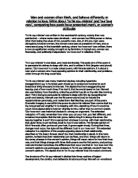As depicted in Andrew Marvell's "To His Coy Mistress," for the best affection to flourish between a couple, love must be embraced at its greatest point during the prime of youth and life. The first stanza of the poem, via numerous romantic suggestions, gives the impression that infinite and timeless love can prosper between two consenting lovers. As the poem opens, the speaker's heart tells the object of its desire that once its love is requited, time and majesty will stand still as they endure the simple pleasures in life. Speaking of "passing our long love's day" (4) as a metonym for an actual eternity of a rich love, Marvell surely marvels his prospective lady as he argues that every singly day of their life together could hold an array of joys in a long and plentiful assortment. Continuing on the path to eternal love, an array of imagery begins to awe any prospective lady by further implying that every moment after embracing his love will contain similar blessings as the poet contends that they could walk along the exotic river of "Ganges' side" (5). As if he had not offered enough, the marvelous poet further adds a piece to the imagery-packed picture by saying that along the trek, his lady would "rubies find" (6), and therefore he implies that as well as sophisticated mental pleasures like walking along a beautiful river, his lady shall enjoy the most base yet desired endearments such as finding jewels. Furthermore, the speaker's eloquence offers a timeless love to his mistress. To show the depth of his potential love as well as amaze his lady with his biblical knowledge, which is a sign of education in Marvell's time, the poet drapes his first idea on this topic with a superb hyperbolic allusion that his heart could love her "ten years before the Flood" (8). A subtle irony in his statement is that the biblical flood in allusion came to eradicate mankind's sin, and, as the poet shall later reveal and foreshadows in this irony, embracing in venereal comforts shall be Marvell's desired prize for making such a convincing argument. However, at this point the genius continues his noble perspective of undying love as he utilizes a sharp conceit in order to show his patience in the matter of waiting for a reply by his coy mistress since his "vegetable love [shall] grow" (11) with time instead of erode by his lady's lack of response. The poet's brilliance concludes this powerful argument with the notion that time will almost stand still as him and his lady enjoy a sophisticated mental bond for all eternity. Marvell begins this brief idea with a synecdoche regarding how he could watch her eyes, her forehead, her chest and all "the rest" (16) for tens of thousands of years. Each aspect of his lady serves as limb for adoration in the eyes of the romantic poet. He goes a bit further in the argument by utilizing a hyperbolic metonym in that fir his lady he will admire "an age ... to every part" (17) to show that he willingly will wait for more than one eternity if it means he shall have his lover all for himself. He eloquently continues this thought by using a connotation usually associated with royalty by saying that only his lady "deserve[s] this state" (19) of existence and worship. Marvell's argument, as if not convincing enough, changes tone in case flattery does not work on making his coy mistress reach a decision.






